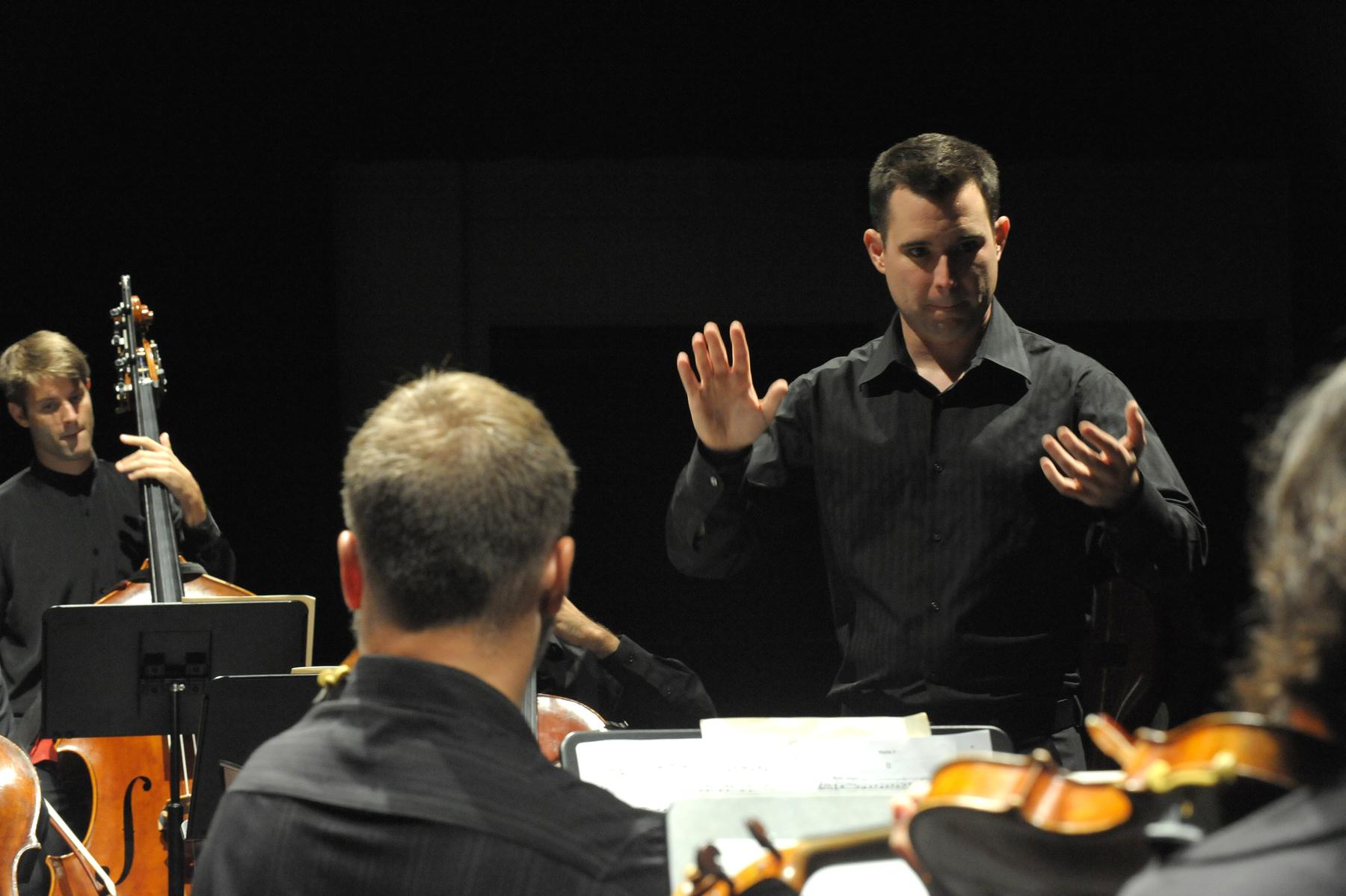Death becomes the Firebird Chamber Orchestra
The Firebird Chamber Orchestra appears to be settling into its home at the Adrienne Arsht Center, and the smart, venturesome program presented Friday night — and running through Sunday — offered an advance on the debut of Patrick Dupre Quigley’s ensemble last month.
A few tweaks to the setup at the Peacock Foundation Studio made a significant difference in the room’s acoustic and on the performance. The sound-deadening curtains were opened up on the rehearsal studio’s long walls, which bestowed a welcome bloom and more color to the strings, much improved over the previous dry and wiry quality. The ensemble also sounded better rehearsed and more secure as a unit, and though there were a few fleeting imprecisions Friday, the Firebird players seem to be quickly coming together as shown in two masterworks by Bach and Schubert on the theme of life after death.
Even among the hundreds of Bach cantatas that have survived, No. 82 Ich habe genug (literally, “I have enough”) figures as one of the German composer’s most affecting works in the genre. Scored for low male voice, oboe and strings, the text reflects on a passage concerning Simeon from the gospel of Luke, in which, after looking upon the face of Christ, the devout believer is prepared to depart life and experience eternal rest.
Placed to the side of the ensemble, Joshua Copeland was an admirable soloist, singing with a simple, confiding expression and technical security, some inflexibility at the bottom of his range apart. Yet even in its spiritual introspection, this intimate music requires more expressive emphasis than the young baritone provided on Friday, with the deeper soundings of the opening section and Schlummert ein, pleasantly sung but rather blank and literal in expression. Copland brought more animation to the final aria, Ich freue mich auf meinem Tod, which reflects the joyful anticipation of eternal life, but overall, his performance was wanting in more directly communicating the essence of the texts.
Leading the 13-member ensemble from the harpsichord, Quigley’s pacing of the gently contrasted movements and recitatives was faultless, conveying the meditative quality, with Adam De Sorgo giving fine, fluid advocacy to the prominent obbligato oboe.
Co-concertmasters Michael Albert and Adda Kridler swapped chairs for the second and final work, Schubert’s String Quartet in D minor, performed in Mahler’s expansion for string orchestra.
The quartet takes its title, Death and the Maiden, from Schubert’s lied of the same name, which the composer employs in the second movement’s theme and variations. The maiden’s pleading entreaty and Death’s soothing response, hail from the same strain of German Protestantism as Bach’s cantata, music that make the next life seem so enticing, it makes you want to jump in your grave. Yet, as always, there is plenty of edge and drama in Schubert’s large-scale quartet as well, music that can be a challenge for even the finest string players. Mahler’s arrangement adds a double-bass and some counterpoint nudges and slight harmonic retouches, but not in an anachronistic way, largely staying faithful to the original.
Quigley is so well known as choral director and engaging interlocutor, that one can forget what a gifted and dynamic conductor he is in non-vocal repertoire. The quartet is written on a vast canvas, yet Quigley structural command and grasp of the music’s character and flow were masterful, and this compelling Schubert performance was the finest thing the Firebird Chamber Orchestra has given us to date.
Quigley and the dozen Firebird musicians kept Schubert’s indelible lyricism and dark drama in a perfectly judged balance, with scrupulous dynamic shading and momentum. The opening movement’s drama received firm expressive impact, with a delicious lilt to the so-Schubertian second theme. The lied variations were vividly characterized, with Kridler skillful in the solo violin flights, the gamboling yet still-uneasy expression of the final Allegro superbly communicated.
The program will be repeated 8 p.m. Saturday and 7 p.m. Sunday at the Adrienne Arsht Center’s Peacock Studio in the Ziff Ballet Opera House. $40. 305-949-6722; www.arshtcenter.org.
Posted in Performances
3 Responses to “Death becomes the Firebird Chamber Orchestra”
Leave a Comment
Sat Nov 22, 2008
at 3:54 pm
3 Comments








Posted Nov 22, 2008 at 5:30 pm by Marcus Cato
Although I enjoy Mr. Quigley’s concerts, and their concomitant love fest from Mr. Johnson, no one seems to point out that Firebird’s musicians are touted as “professionals” but are really fellows from the New World Symphony. That lack of experience was obvious in Firebird’s inaugural concert. One can only hope that Firebird will really hire professionals moving forward.
Posted Nov 25, 2008 at 6:38 pm by Lawrence A. Johnson
The members of the Firebird Chamber Orchestra are all professional musicians, not students. Also, none are current New World Symphony members. It would have been a neat trick for them to play Saturday night’s Firebird concert and the New World program under Thomas Ades at the same time.
Posted Nov 26, 2008 at 11:46 pm by Michael Klotz
Marcus,
I am the violist of the Amernet String Quartet, and a Prof. at FIU. I have never been a member of New World Symphony. I enjoy working with Patrick Quigley immensely as do all of the other musicians of the Firebird Chamber Orchetra. Having performed with some of America’s leading chamber ensembles and at festivals with world reknowned musicians, I can assure you that the quality of the Firebird Chamber Orchetra is on par with these folks and that you need to take the wax out of your ears and get rid of the sour grapes.